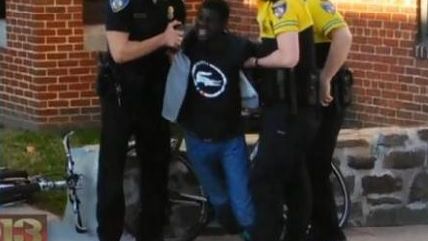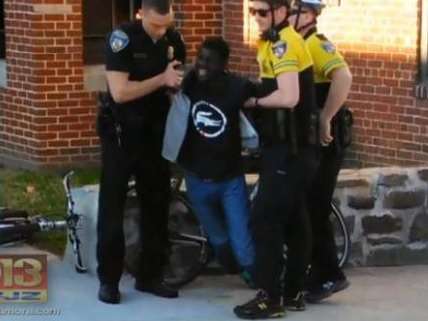New Theory: Freddie Gray's Head Hit Bolt in Van. Doesn't Matter, Police Issues the Same.
No matter what happened to Freddie Gray government can't afford to afford police the privileges it does.


Fox News reports, based on anonymous sources, that the head injury sustained by Freddie Gray could've matched in size and shape to a bolt in the back of a van. The sources suggest that could match with what the second prisoner in the van said. There is going to be a lot of this. Now that the police investigative report has been sent to prosecutors, there's more cover to speak to the press anonymously, be it to leak factual information about the case or push an agenda, one way or another.
But none of it matters.
Last month in an article about the Rolling Stone UVA story, The New Republic's Elizabeth Bruenig bemoaned that the right "tends to understand politics on the individual level" and so "tends to pore over the specific details of high-profile cases like Trayvon Martin and Michael Brown." The observation is sharp, but also stunning for its lack of self-awareness. The left, too, uses personal tales as stand ins for wider policies, and not just because the right does so. Look at the persistence of the "hands up, don't shoot myth," debunked by the Obama Department of Justice (DOJ). When a (black, because these things matter to the left) New York Times reporter wrote that Michael Brown was "no angel" in a thoughtful profile about the 18-year-old killed by police, the left freaked out. Why? It's not just "angels" that deserve not to be killed by police. The DOJ also reported the shooting was justified because Brown had, in fact, attempted to take control of the cop's gun.
Even given all of this, there's an important conversation to be had about when cops should interact with residents (Michael Brown and a companion were jaywalking when Darren Wilson engaged them), how long police should leave the bodies of their victims on the street (Brown's lay there for hours for the neighborhood to see), why Darren Wilson was allowed to go home and wash his hands and not speak to authorities for some time, and even how Ferguson uses its police department to treat its residents like revenue streams. All of these important issues that intersect in the case of Michael Brown and many others get lost because the left, like the right, needs its personal tales.
And so it is with Freddie Gray. In the best case (for the cops) scenario, Gray's death is legitimately the result of an unbelievable freak accident. That doesn't change the facts underlying what made the interaction and death controversial: that cops in Baltimore use eye contact as probable cause, that law enforcement officials have 10 days to line up representation after someone dies in their custody, and that the Baltimore police department has cost city taxpayers millions in various police brutality claims. None of these issues are as intractable as some of the root causes of the problems seem. The abomination know n as the law enforcement officer bill of rights, which grants cops a lot of the problematic privileges, was passed in Maryland only in the early 1970s—and it was the first state to pass one. Racism and violence and poverty and corruption in authority are all age-old problems. Luckily for those concerned about the level of police killings and general police brutality, the rules which govern police, and create the space for the brutality more and more Americans are starting to see as unacceptable, aren't age-old problems. And neither are the laws—like the ones against possessing drugs , selling loose cigarettes, or even using the left lane only to pass—that contribute to the number of police-resident interactions in the country.


Show Comments (43)